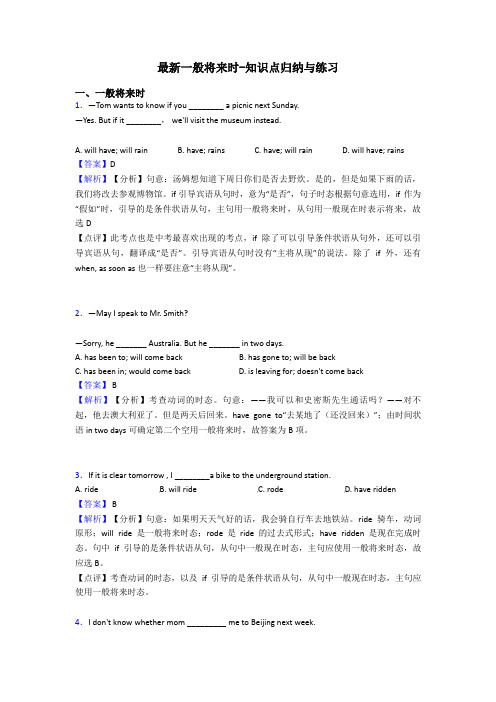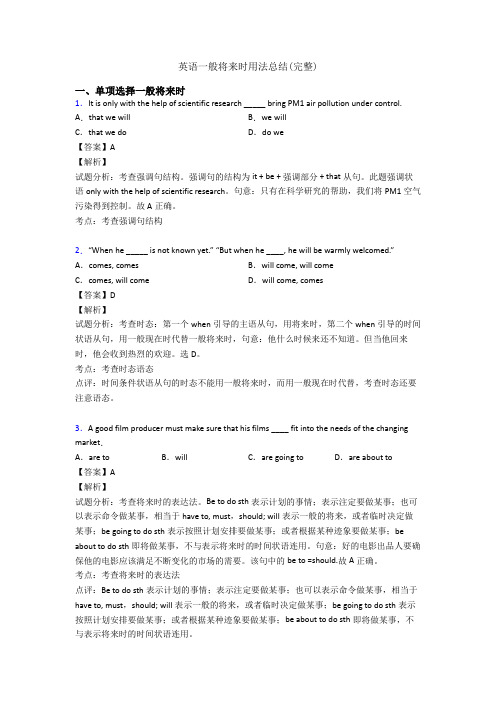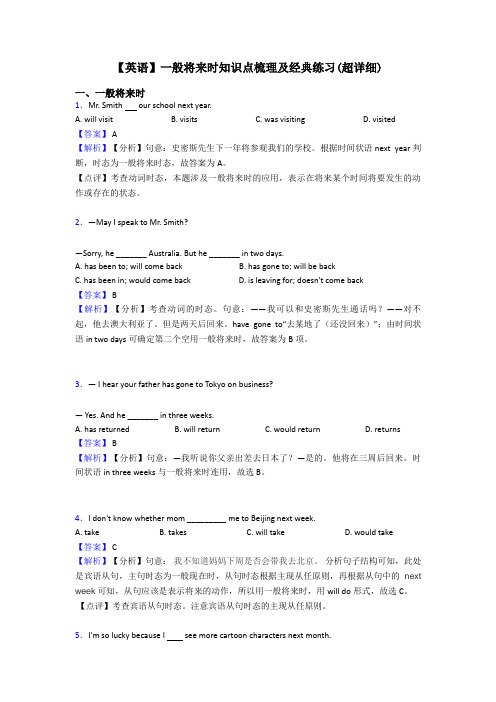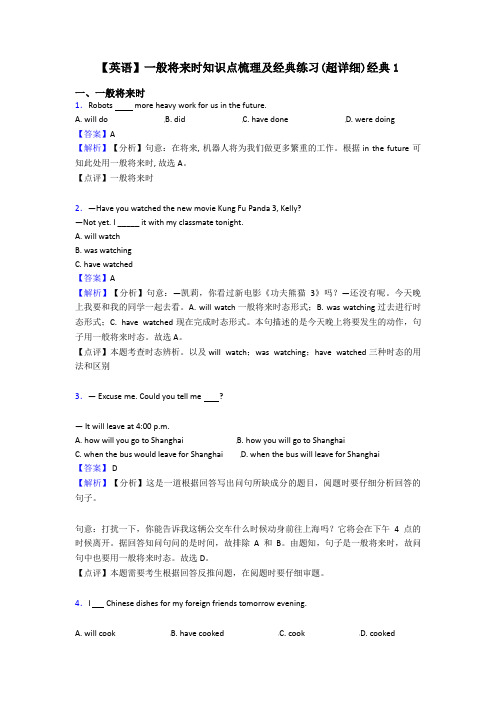一般将来时的用法归纳练习
最新一般将来时-知识点归纳与练习

最新一般将来时-知识点归纳与练习一、一般将来时1.—Tom wants to know if you ________ a picnic next Sunday.—Yes. But if it ________, we'll visit the museum instead.A. will have; will rainB. have; rainsC. have; will rainD. will have; rains 【答案】D【解析】【分析】句意:汤姆想知道下周日你们是否去野炊。
是的,但是如果下雨的话,我们将改去参观博物馆。
if引导宾语从句时,意为“是否”,句子时态根据句意选用,if 作为“假如”时,引导的是条件状语从句,主句用一般将来时,从句用一般现在时表示将来,故选D【点评】此考点也是中考最喜欢出现的考点,if除了可以引导条件状语从句外,还可以引导宾语从句,翻译成“是否”。
引导宾语从句时没有“主将从现”的说法。
除了if外,还有when, as soon as也一样要注意“主将从现”。
2.—May I speak to Mr. Smith?—Sorry, he _______ Australia. But he _______ in two days.A. has been to; will come backB. has gone to; will be backC. has been in; would come backD. is leaving for; doesn't come back【答案】 B【解析】【分析】考查动词的时态。
句意:——我可以和史密斯先生通话吗?——对不起,他去澳大利亚了。
但是两天后回来。
have gone to“去某地了(还没回来)”;由时间状语in two days可确定第二个空用一般将来时,故答案为B项。
3.If it is clear tomorrow , I ________a bike to the underground station.A. rideB. will rideC. rodeD. have ridden【答案】 B【解析】【分析】句意:如果明天天气好的话,我会骑自行车去地铁站。
英语一般将来时用法总结(完整)

C.will rewardD.will be rewarded
【答案】D
【解析】
【分析】
【详解】
本题考查时态和语态。解题步骤:1.确定时态:根据句尾的in the end可知,事情发生在将来,用将来时。2.确定语态:efforts和reward是被动关系,应该使用被动语态。句意:学生们一直在刻苦学习功课,他们的努力终将会得到回报。综上,用一般将来时的被动,故选D。
—Really? But don’t worry!I________to the hospital and see him this afternoon.
A.will goB.am going
C.have goneD.went
【答案】A
【解析】
从第二人回答的“Really?”可以看出他在此之前并不知道Mike住进医院的事情。所以,今天下午去医院探视就不会是早就有的计划,所以排除B项。
考点:考查将来时的表达法
点评:Be to do sth表示计划的事情;表示注定要做某事;也可以表示命令做某事,相当于have to, must,should; will表示一般的将来,或者临时决定做某事;be going to do sth表示按照计划安排要做某事;或者根据某种迹象要做某事;be about to do sth即将做某事,不与表示将来时的时间状语连用。
A.comes, comesB.will come, will come
C.comes, will comeD.will come, comes
【答案】D
【解析】
试题分析:考查时态:第一个when引导的主语从句,用将来时,第二个when引导的时间状语从句,用一般现在时代替一般将来时,句意:他什么时候来还不知道。但当他回来时,他会收到热烈的欢迎。选D。
【英语】一般将来时知识点梳理及经典练习(超详细)

【英语】一般将来时知识点梳理及经典练习(超详细)一、一般将来时1.Mr. Smith our school next year.A. will visitB. visitsC. was visitingD. visited【答案】 A【解析】【分析】句意:史密斯先生下一年将参观我们的学校。
根据时间状语next year判断,时态为一般将来时态,故答案为A。
【点评】考查动词时态,本题涉及一般将来时的应用,表示在将来某个时间将要发生的动作或存在的状态。
2.—May I speak to Mr. Smith?—Sorry, he _______ Australia. But he _______ in two days.A. has been to; will come backB. has gone to; will be backC. has been in; would come backD. is leaving for; doesn't come back【答案】 B【解析】【分析】考查动词的时态。
句意:——我可以和史密斯先生通话吗?——对不起,他去澳大利亚了。
但是两天后回来。
have gone to“去某地了(还没回来)”;由时间状语in two days可确定第二个空用一般将来时,故答案为B项。
3.— I hear your father has gone to Tokyo on business?— Yes. And he _______ in three weeks.A. has returnedB. will returnC. would returnD. returns【答案】 B【解析】【分析】句意:—我听说你父亲出差去日本了?—是的。
他将在三周后回来。
时间状语in three weeks与一般将来时连用,故选B。
4.I don't know whether mom _________ me to Beijing next week.A. takeB. takesC. will takeD. would take【答案】 C【解析】【分析】句意:我不知道妈妈下周是否会带我去北京。
一般将来时-知识点归纳与练习

一般将来时-知识点归纳与练习一、一般将来时1.—Do you know ______?—The day after tomorrow.A. when we visited the museumB. when we will visit the museumC. when did we visit the museumD. when will we visit the museum【答案】 B【解析】【分析】句意:——你知道我们什么时候参过博物馆吗?——后天。
Do you know 后接宾语从句,应使用陈述结构,因此排除C和D,根据答语The day after tomorrow.可知问句使用一般将来时,故答案是B。
【点评】考查宾语从句的语序各时态,注意宾语从句使用陈述语序,根据答语确定问句的时态。
2.— I hear your father has gone to Tokyo on business?— Yes. And he _______ in three weeks.A. has returnedB. will returnC. would returnD. returns【答案】 B【解析】【分析】句意:—我听说你父亲出差去日本了?—是的。
他将在三周后回来。
时间状语in three weeks与一般将来时连用,故选B。
3.I’m so lucky because I see more cartoon characters next month.A. is able toB. will be able toC. be able toD. was able to【答案】B【解析】【分析】句意:我真幸运因为我下个月能看到更多的卡通人物。
next month表将来,因此用will be able to。
故选B。
【点评】考查一般将来时。
4.—Do you know when Mrs. White for dinner this evening?—No, but I think she when she is free.A. will come; will comeB. will come; comesC. comes; will come【答案】 A【解析】【分析】句意:——你知道怀特太太今晚是否来吃晚饭吗?——不知道。
一般将来时-知识点归纳与练习经典

一般将来时-知识点归纳与练习经典一、一般将来时1.—Could you tell me_______?—In five minutes, at 10: 25.A. when did the next underground arriveB. when the next underground arrivedC. when will the next underground arriveD. when the next underground will arrive【答案】D【解析】【分析】句意:—你能告诉我下一个地铁什么时候到吗?—五分钟后,10点25分。
tell后跟宾语从句,宾语从句需用陈述句语序,A、C两项都是疑问句语序,可排除。
根据答语In five minutes,结合句意语境,可知还没有到站,需用一般将来时态,故答案选D。
【点评】考查宾语从句。
根据语境确定宾语从句的时态,注意陈述语序。
2.— Excuse me. Could you tell me ?— It will leave at 4:00 p.m.A. how will you go to ShanghaiB. how you will go to ShanghaiC. when the bus would leave for ShanghaiD. when the bus will leave for Shanghai【答案】 D【解析】【分析】这是一道根据回答写出问句所缺成分的题目,阅题时要仔细分析回答的句子。
句意:打扰一下,你能告诉我这辆公交车什么时候动身前往上海吗?它将会在下午4点的时候离开。
据回答知问句问的是时间,故排除A和B。
由题知,句子是一般将来时,故问句中也要用一般将来时态。
故选D。
【点评】本题需要考生根据回答反推问题,在阅题时要仔细审题。
3.I _________ the shops. Can I get you anything?A. go toB. went toC. have gone toD. am going to【答案】 D【解析】【分析】句意:我将去商店,我可以给你买一些东西吗迭项八是一般现在时,表示经常性的行为或状态;选项B是一般过去时,表示动作发生在过去,和现在没有关系;选项C 是现在完成时,表示过去发生的动作对现在造成的影响或结果。
【英语】一般将来时知识点梳理及经典练习(超详细)经典1

【英语】一般将来时知识点梳理及经典练习(超详细)经典1一、一般将来时1.Robots more heavy work for us in the future.A. will doB. didC. have doneD. were doing【答案】A【解析】【分析】句意:在将来, 机器人将为我们做更多繁重的工作。
根据in the future 可知此处用一般将来时, 故选A。
【点评】一般将来时2.—Have you watched the new movie Kung Fu Panda 3, Kelly?—Not yet. I _____ it with my classmate tonight.A. will watchB. was watchingC. have watched【答案】A【解析】【分析】句意:—凯莉,你看过新电影《功夫熊猫3》吗?—还没有呢。
今天晚上我要和我的同学一起去看。
A. will watch一般将来时态形式;B. was watching过去进行时态形式;C. have watched现在完成时态形式。
本句描述的是今天晚上将要发生的动作,句子用一般将来时态。
故选A。
【点评】本题考查时态辨析。
以及will watch;was watching;have watched三种时态的用法和区别3.— Excuse me. Could you tell me ?— It will leave at 4:00 p.m.A. how will you go to ShanghaiB. how you will go to ShanghaiC. when the bus would leave for ShanghaiD. when the bus will leave for Shanghai【答案】 D【解析】【分析】这是一道根据回答写出问句所缺成分的题目,阅题时要仔细分析回答的句子。
一般将来时-知识点归纳与练习(1)
一般将来时-知识点归纳与练习(1)一、一般将来时1.There ___________ a meeting tomorrow afternoon.A. will be going toB. will going to beC. is going to beD. will go to be【答案】 C【解析】【分析】句意:明天下午将有一次会议。
根据时间状语tomorrow afternoon 可知这里应该是there be结构的将来时:there will be或there is going to be,根据句意,故答案为C。
【点评】考查be going to表示按计划,安排将要发生的事。
注意掌握一般将来时的构成,意义和用法。
2.— I hear your father has gone to Tokyo on business?— Yes. And he _______ in three weeks.A. has returnedB. will returnC. would returnD. returns【答案】 B【解析】【分析】句意:—我听说你父亲出差去日本了?—是的。
他将在三周后回来。
时间状语in three weeks与一般将来时连用,故选B。
3.I’m so lucky because I see more cartoon characters next month.A. is able toB. will be able toC. be able toD. was able to【答案】B【解析】【分析】句意:我真幸运因为我下个月能看到更多的卡通人物。
next month表将来,因此用will be able to。
故选B。
【点评】考查一般将来时。
4.—Do you know when Mrs. White for dinner this evening?—No, but I think she when she is free.A. will come; will comeB. will come; comesC. comes; will come【答案】 A【解析】【分析】句意:——你知道怀特太太今晚是否来吃晚饭吗?——不知道。
【英语】一般将来时-知识点归纳与练习(word)
【英语】一般将来时-知识点归纳与练习(word)一、一般将来时1.- Do you have any plans for tonight?- Yes, I at the new Italian restaurant in town.A. eatB. have eatenC. ateD. am going to eat【答案】 D【解析】【分析】句意:——你今晚有什么计划吗? ——是的, 我打算在镇上新开的意大利饭馆吃饭。
根据句中的时间词“tonight”判断此句应是一般将来时, 结构:am/is/are+ going to do; will do.故直接选D即可。
【点评】一般将来时2.I don't know if he _____ tomorrow. If he _____, I'll go to see him.A. leaves; gets upB. will go; will goC. will come; comesD. is arriving; leaves【答案】 C【解析】【分析】我不知道明天他是否会来。
如果他来了,我会去看他。
结合语境可知前文是宾语从句,根据时间状语可知从句中描述的是将来的动作,故用一般将来时态。
下文是条件状语从句,当主句描述将来动作时,条件状语从句中用一般现在时态表示将来的动作,故选C。
【点评】英语宾语从句的时态和主句没有必然的联系,需结合语境进行具体分析。
而英语状语从句的时态与主句有比较紧密的联系,若主句为一般将来时,时间和条件状语从句通常要用一般现在时表示将来,而不能直接使用将来时态。
3.We ________ a party for Kate. It's supposed to be a surprise.A. were havingB. hadC. will haveD. have had【答案】C【解析】【分析】句意:我们将为凯特举办一个聚会。
英语一般将来时用法总结(完整)
英语一般将来时用法总结(完整)一、单项选择一般将来时1.If Kate goes to the gym this weekend, _______.A.so do I B.so I doC.so will I D.so I will【答案】C【解析】试题分析:句意:如果凯特这个周末去体育馆,我也去。
If引导的条件状语从句用一般现在时态表示一般将来时态,主句用一般将来时态;又因为前句说Kate去体育馆,后句说I也去体育馆,故用全部倒装。
故选C。
考点:考查时态和全部倒装句。
2.If their marketing plans succeed, they ________ their sales by 20 percent.A.will increase B.have been increasingC.have increased D.would be increasing【答案】A【解析】句意:要是他们的市场计划成功了,他们将增加20%的销售额。
从句是一般现在时表将来,主句常用一般将来时或情态动词can/may+动词原形。
3.--- I’d like a mountain bi ke which ____ well?--- Will this one _____?A.rides; work B.rides; do C.is ridden; do D.is ridden; work【答案】B【解析】试题分析:考查主动形式表示被动含义用法。
一些不及物动词与副词连用,表示主语的特征。
如wash well,write well等;用主动形式表示被动的含义。
本句中的ride well指自行车好骑;第二空的do表示行。
句意:—我想买一辆很好骑的山地车。
—这个行吗?根据句意说明B正确。
考点:考查主动形式表示被动含义的用法。
点评:。
一些不及物动词与副词连用,表示主语的特征。
如wash well,write well等;用主动形式表示被动的含义。
【英语】一般将来时-知识点归纳与练习经典
【英语】一般将来时-知识点归纳与练习经典一、一般将来时1.— I hear Leo will leave for Korea for a meeting.— Really? Do you know when he _______.A. will startB. to startC. started【答案】 A【解析】【分析】句意:——我听说Leo要去韩国开会。
——真的吗?你知道他什么时候出发吗?when何时,此处询问将来的时间,故用一般将来时,因此选A。
【点评】考查动词的时态。
2.I’m so lucky because I see more cartoon characters next month.A. is able toB. will be able toC. be able toD. was able to【答案】B【解析】【分析】句意:我真幸运因为我下个月能看到更多的卡通人物。
next month表将来,因此用will be able to。
故选B。
【点评】考查一般将来时。
3.Look on the bright side of life,and imagine that you ______ a happy and successful future.A. hadB. will haveC. haveD. have had【答案】 B【解析】【分析】考查时态.句意"看看生活中美好的一面,想象你会有一个幸福和成功的未来.".A过去时.B一般将来时态.C动词原形.D现在完成时态.结合语境"看看生活中美好的一面,想象你___一个幸福和成功的未来.",由future未来,可知,表示将来,用一般将来时态.答案是B.4.I don't know if he _____ tomorrow. If he _____, I'll go to see him.A. leaves; gets upB. will go; will goC. will come; comesD. is arriving; leaves 【答案】 C【解析】【分析】我不知道明天他是否会来。
- 1、下载文档前请自行甄别文档内容的完整性,平台不提供额外的编辑、内容补充、找答案等附加服务。
- 2、"仅部分预览"的文档,不可在线预览部分如存在完整性等问题,可反馈申请退款(可完整预览的文档不适用该条件!)。
- 3、如文档侵犯您的权益,请联系客服反馈,我们会尽快为您处理(人工客服工作时间:9:00-18:30)。
译林版中考英语九年级英语一般将来时的用法归纳练习一、初中英语一般将来时1.Our English ______ far better in a month if we try harder.A. becomesB. will becomeC. has becomeD. became【答案】 B【解析】【分析】:如果我们更努力。
我们的英语在一月后会更好的。
本句是一个含有条件状语从句的主从复合句。
而条件状语从句中用的是一般现在时,所以主句该用一般将来时,因此选B。
【点评】考查动词时态。
2.If it is clear tomorrow , I ________a bike to the underground station.A. rideB. will rideC. rodeD. have ridden【答案】 B【解析】【分析】句意:如果明天天气好的话,我会骑自行车去地铁站。
ride骑车,动词原形;will ride是一般将来时态;rode是ride的过去式形式;have ridden是现在完成时态。
句中if引导的是条件状语从句,从句中一般现在时态,主句应使用一般将来时态,故应选B。
【点评】考查动词的时态,以及if引导的是条件状语从句,从句中一般现在时态,主句应使用一般将来时态。
3.— I hear your father has gone to Tokyo on business?— Yes. And he _______ in three weeks.A. has returnedB. will returnC. would returnD. returns【答案】 B【解析】【分析】句意:—我听说你父亲出差去日本了?—是的。
他将在三周后回来。
时间状语in three weeks与一般将来时连用,故选B。
4.— There ________a football match on TV tonight. I can't wait to watch it.— Me, too. It's ________ Guangzhou Evergrande and the Australian team Melbourne Victory.A. will be; betweenB. will be; bothC. will have; betweenD. will have; both【答案】A【解析】【分析】句意为:---今晚将有一场电视直播足球比赛,我非常想看。
---我也是。
这是广州恒达足球俱乐部与澳大利亚墨尔本足球俱乐部之间的比赛。
根据语境,这是there be结构的一般将来时,应用there will be;both指两者,between指两者之间。
故选A。
【点评】考查there be结构以及词语辨析。
5.Could you tell me____?A. when will they leave BeijingB. when would they leave BeijingC. when they will leave BeijingD. when they would leave Beijing【答案】 C【解析】【分析】句意:你能告诉我他们什么时候离开北京吗?这是含有宾语从句的主从复合句。
从句用陈述语序,疑问词+主语+谓语,故排除A B;主句中的could表示语气的委婉,不是过去时。
根据句意,从句用一般将来时。
故选C。
【点评】此题考查宾语从句。
注意从的语序和时态。
6.— Do you know when he tomorrow?— Don't worry. I think as soon as he , he will give you a call.A. will come; will comeB. will come; comesC. comes; will comeD. comes; comes 【答案】 B【解析】【分析】这是一道考查一般将来时以及as soon as 结构使用的题目。
句意:你知道他明天什么时候来吗?不用担心,我认为他来了,他会给你打电话的。
由tomorrow知第一句为一般将来时,故第一个空填will come 形式;as soon as 引导时间状语从句,主句用一般将来时,从句用一般现在时表一般将来时,故第二个空填comes。
故选B。
【点评】本题考查一般将来时,以及as soon as结构的用法,在平时学习中要充分掌握时态,以及常见的引导时间状语从句的短语的用法。
7.—Could you tell me_______?—In five minutes, at 10: 25.A. when did the next underground arriveB. when the next underground arrivedC. when will the next underground arriveD. when the next underground will arrive【答案】D【解析】【分析】句意:—你能告诉我下一个地铁什么时候到吗?—五分钟后,10点25分。
tell后跟宾语从句,宾语从句需用陈述句语序,A、C两项都是疑问句语序,可排除。
根据答语In five minutes,结合句意语境,可知还没有到站,需用一般将来时态,故答案选D。
【点评】考查宾语从句。
根据语境确定宾语从句的时态,注意陈述语序。
8.If you go to bed earlier, you tired in the morning.A. will feelB. don't feelC. won't feelD. didn't feel【答案】 C【解析】【分析】句意:如果你上床睡觉早些,在早上你就不会感觉到累了。
此题考查if 引导的条件状语从句,主句一般将来时,从句用一般现在时。
根据句意,故选C。
【点评】考查动词时态。
掌握主将从现的句子结构。
9.-- Tommy, do you know if they _____ to the zoo this Sunday if it _____?-- Sorry, I have no idea.A. will go; is fineB. go; is fineC. will go; is going to be fineD. go; will be fine【答案】 A【解析】【分析】句意:——Tommy,你知道这个星期天如果晴天他们是否去动物园吗?——对不起,我不知道。
第一个空前的if引导宾语从句,意思是“是否”,根据从句的tomorrow可知用一般将来时;第二个空前的if引导条件状语从句,意思是“如果”,从句中用一般现在时表示将来,故选A。
【点评】考查动词的时态。
10.We____ shopping unless it ____ tomorrow.A. will go, will rainB. go, will rainC. will go, rainsD. go, rains【答案】C【解析】【分析】句意:除非明天下雨,否则我们将会去购物。
unless 除非,引导条件状语从句,从句中应该用一般现在时表示将来,主句用一般将来时。
故应选C。
【点评】考查动词时态。
11.— Excuse me, what time does Flight BA 2793 leave?—Just a minute. I____for you.A. checkB. checkedC. will checkD. havc checked【答案】C【解析】【分析】句意:——打扰一下,航班BA 2793什么时候起飞?——稍等一下,我给您查找。
根据Just a minute.稍等一下,可知动作还未做,时态用一般将来时will+动词原形。
故选C。
【点拨】本题考查一般将来时,注意熟记结构will+动词原形。
12.—I wonder if you for a picnic tomorrow.—If it ,I will go.A. go, not rainB. go, doesn't rainC. will go, isn't rain.D. will go, doesn't rain.【答案】 D【解析】【分析】句意:--我想知道明天你是否去野餐。
--如果天不下雨,我就去。
分析:第一个句子为宾语从句,主句为一般现在时,从句用原来的时态;第二个句子为条件状语从句,体现主将从现的原则,主语是第三人称单数,因此助动词用does.故选D【点评】考查动词的用法。
13.Simon is interested in American culture. He _______________ English at Troy University next year.A. studyB. studiedC. will studyD. would study【答案】 C【解析】【分析】句意:西蒙对美国文化感兴趣,明年他将要在美国特洛伊大学学习英语。
根据next year明年,可知时态是一般将来时,结构为will+do,故选C。
【点评】考查一般将来时,识记一般将来时的用法。
14.My father_________ very busy this week. He _________free next week.A. will be ; isB. is ; isC. will be ; will beD. is ; will be【答案】 D【解析】【分析】句意:父亲这一周很忙。
下一周他将是空闲的。
this week,指现在的状态,用一般现在时:主语+动词原形,如果主语是第三人称单数,谓语动词也变成第三人称单数,next week.指将来的状态,用将来时态:主语+will do。
故选D。
【点评】考查动词时态的用法15. We some robots at home in the future, and there some in the office,too.A. will have; will haveB. have; will beC. will have; will beD. will have; are 【答案】 C【解析】【分析】句意:在将来我们家里将有一些机器人并且办公室里也将会有一些。
there be句型表示“某地(或某时)存在有某人(或某物),而并非某地(某人、某物或某时)拥有什么东西”,句中有若干个名词作主语,动词be常与后面主语中的第一个名词在数上保持一致。
